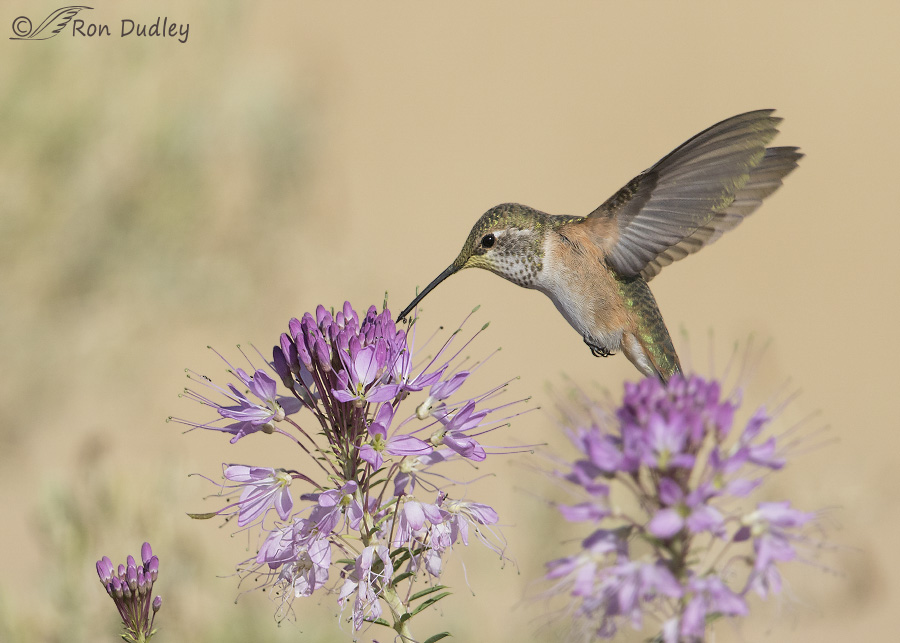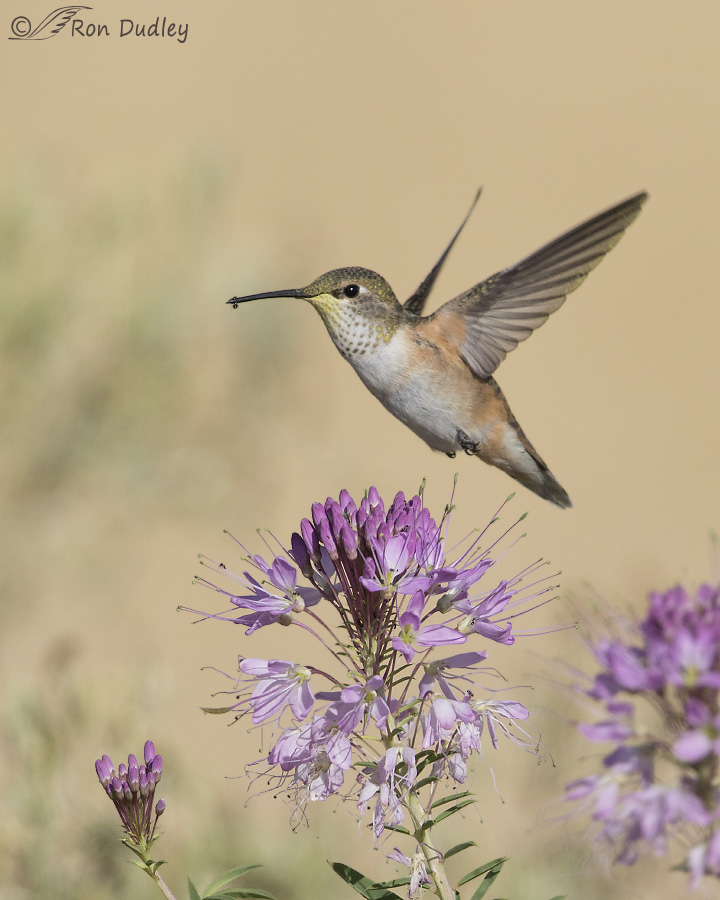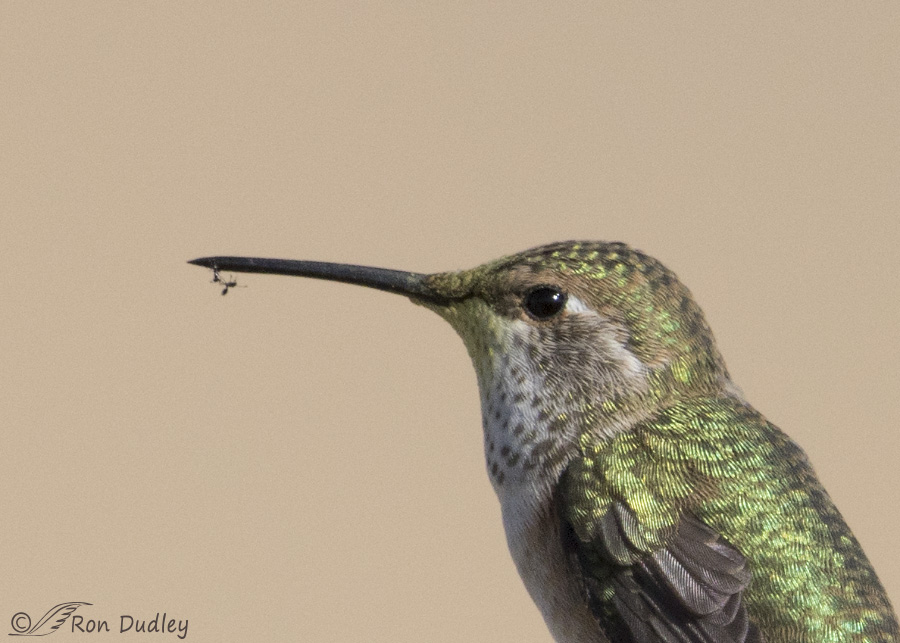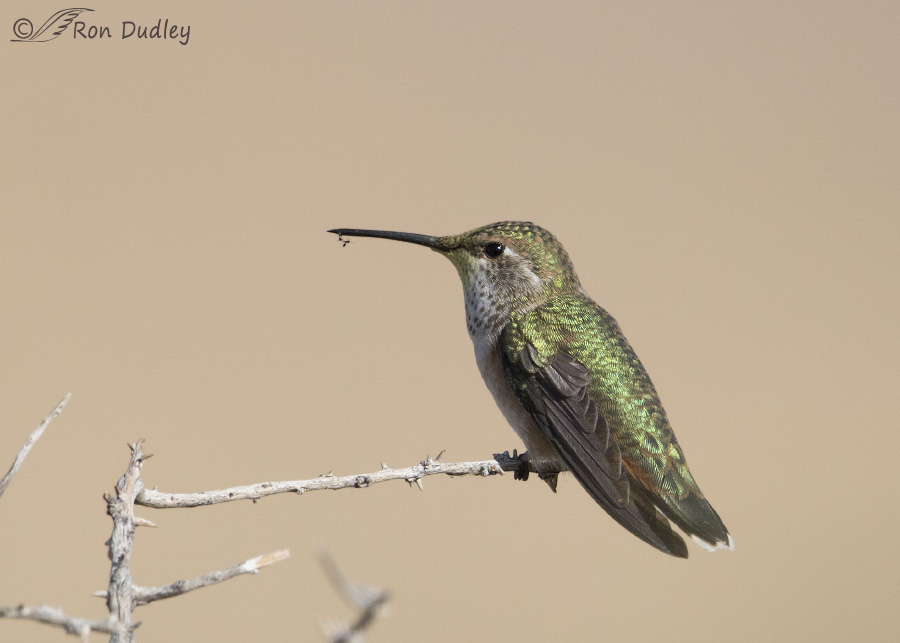I have fewer opportunities with hummingbirds than many bird photographers because I won’t photograph them at setups (or flash them). I much prefer a natural setting, natural light and behaviors that haven’t been coerced.
My chances with hummingbirds mostly come when they’re feeding on nectar of Rocky Mountain beeplant but this year beeplant has been very difficult to find. I’ve been watching a small patch of it since it started blooming recently but haven’t seen any hummingbirds there.
Until yesterday.

1/5000, f/6.3, ISO 640, Canon 7D Mark II, Canon EF 500mm f/4L IS II USM + 1.4 tc, not baited, set up or flashed
A single Calliope Hummingbird was at the beeplant for about 10 seconds and I managed two shots I like fairly well. I wish I’d been slightly closer and that it’s tail wasn’t cut off by the flower but I like the flight posture, the feeding behavior and the frozen wings at this high shutter speed.

1/5000, f/6.3, ISO 640, Canon 7D Mark II, Canon EF 500mm f/4L IS II USM + 1.4 tc, not baited, set up or flashed
In the next frame I caught the hummer as it flew over the flower it had been feeding on.
Notice that the bird has a bit of debris on its bill. At first I didn’t pay much attention to it but then I remembered that many hummingbirds get their protein from hawking small flying insects out of the air and that made me wonder…

So I very heavily cropped (5% of the original image) another photo of the same bird while it was perched far away from me and sure enough, the “debris” turned out to be several very small insects clinging to its bill. Right now the morning air in this area is filled with hordes of tiny flying insects (they’re not biting gnats) that are so small that I only notice them when they try to land on my windshield and slide down the slippery glass like miniscule bits of fire ash.
The bird made no attempt to eat the insects or clean them off its bill that I’m aware of.
Ron
PS – My skills at identifying hummingbirds, particularly females and immatures, are quite limited so if this isn’t a Calliope Hummingbird please correct me.
Late addendum: I’m adding this more loosely cropped version of the last photo for a better look at the tail and wingtips in case it might help with positive ID of the bird, one way or another…



Amazing shots! My first instinct would be to call that a rufous, because of the flank color. But female hummers are tough…
Beautiful shots Ron. I too thought it was a Anna’s Hummer. Hope you see more Hummers.
Thanks, Jean. I wouldn’t argue with you because I just don’t know…
What a glorious sight. And YOUR glorious site, starts my day smiling so often.
Megathanks.
I’ll bet you’d enjoy hummingbirds if you had them in Australia, EC (though I understand you have some species that are similar…).
I love it!! Hummers are my favorite!!
Thank you, Nicole.
Beautiful. Juveniles are hard to identify. Often individual birds have enough difference in markings they don’t match the reference photos. I have so many hummingbirds at my 4 feeders I am filling them everyday. When I sit out in my yard I feel like a dart board as they chase each other often flying so close to me they brush me with wings.
I envy you all your hummingbirds, April.
Super capture! I like natural surroundings also. Could it be a female Anna’s? My birding I.D. skills are sorely lacking.
I’d hesitate to say, Linda. I just don’t know my hummers very well.
Ron, fantastic images! Beautiful hummingbird photos always get my attention, especially when not created through elaborate flash setups. Like you, the only photos of hummers I’ve created have been natural settings and lighting. Though, I have to say, your shots here are far and away better than anything I’ve yet to create. Beautiful detail, color, background, and some nice poses, especially the second. These are birds I just love to watch, whether I have a camera around or not. Just fascinating. As for identifying them, I have a lot to learn in that regard. The only hummers we get out here are Ruby-throated, which makes them easy to identify. Again, beautiful work and thanks for sharing! Very inspiring.
Thanks very much, Todd. Sounds lie you and I share some method preferences when it comes to photographing hummingbirds.
Beautiful shots of a favorite of mine. These birds just fascinate me. I have two at my feeder on my patio right now. We have a ritual. Each morning when I go to the patio, I tap the feeder and make a clicking sound. They usually respond from their perch off in the trees. As soon as I sit down they come to the feeder. Many times they will come whizzing past my face quite literally a foot away. Other times they will come up a foot or so and just “sit” and take a look at me for 2-3 seconds then flit off!! Interesting little birds.
Love the pictures and thanks for sharing them. I also appreciate your style by not disturbing your creatures.
Sounds like you have your hummers conditioned, Carol. Love your technique!
P. S. Looking again, there are ants all over those flowers …
Good eye! I can see several of them.
Ron, I enjoy your blog every single day, even though I don’t often comment. So, thank you for all the inspiring photos and lessons.
In this series, I especially like the second photo and thought it looked Iike an ant in the bird’s bill, then I noticed that even in the first photo, that tidbit is already there. I wonder if the bird plucked an ant from the flower it was feeding on?
I wondered the same thing, Nancy. Who knows…
A wonderful series of a quick-moving flying jewel! Amazing that you were able to get those high speed wings in such detail. I love the iridescence…
Thank you, Patty.
Beautiful!!! I’m up grand mesa right now. 10,000 feet up. There’s lots of hummingbirds up here. They perch in trees at my campsite and buzz around us. But I don’t even attempt to photograph them.. I stick to larger slower moving birds.
It can be interesting to try, Marina. It’s a good test of one’s patience and perseverance…
Wow– did I love that glorious gold-washed detail of the feathers, closely focused ! Here in very far south Utah, I’ve noticed that my feeders are going
begging ( except for the rufous bullies who drive all the others off ) but the others appear to be eating insects on the wing -and I’ve wondered if it is a
change in feeding habit that customarily precedes migration–anyone know about this ?
Interesting question, Kris. I haven’t a clue but my gut instinct would be that they’d need the high energy nectar for migration…
Wonderful. Just wonderful. I get to see a limited number of hummers with Ruby-throated Hummingbird being the most frequent. Why is this hummer not a Broad-tailed? Any pictures of the bird with the tail spread or showing how far the tail projects beyond the wing tips on the sitting bird?
Your bird seems to be missing the thin white line above the gape that Sibley discribes. It is amazing to see your bird in such detail, leftovers for later and all!
Kathy, I have no photos of the spread tail.
But perched the tip of the tail has a white terminal edge and the wingtips are very slightly shorter than the tail. I’ve added another version of the last photo so the tail and wingtips can be better seen.
Thanks. An amazing picture of a wonderful bird whichever species it is. I’m think Calliope, too. (or Broad-tailed, it can be so confusing, LoL.)
Good shots, Ron. We get a couple coming through here in the fall that stay for a few days stocking up from whatever is in bloom in my garden and a feeder I do put out for them. They are a challenge to catch in one spot! On another note; Outdoor Photographer for Sept. has a beautiful cover with an aerial of the Red Rock River in the Centennial Valley.
We get a couple coming through here in the fall that stay for a few days stocking up from whatever is in bloom in my garden and a feeder I do put out for them. They are a challenge to catch in one spot! On another note; Outdoor Photographer for Sept. has a beautiful cover with an aerial of the Red Rock River in the Centennial Valley. 
Thanks for the heads up on that cover, Judy. I just checked it out online and it’s a beauty. Got my Montana juices flowing again…
Love your shots of this hummer as I have also done when you have put up other images of this species . As I am sure you already know there are other female or immature hummers that look similar to the Calliope, but being from the East and only seeing Ruby-throats and having to travel to FL, TX and CA to see other species of hummers, I won’t even attempt a different ID. I will just settle down and enjoy the glory of these images of a Calliope!!
Thanks, Dick. I’ll stick to “Calliope” unless I hear otherwise from someone in the know…
Do es “coerced” mean at a hummingbird feeder?
For me it does, Duane. I make no judgments about those who photograph birds at feeders (unless the photographer tries to pass the photos off as being taken in a natural setting – for me, disclosure is key). It’s just that I prefer natural settings and behaviors that I’ve influenced as little as possible.
I do occasionally photograph birds, including hummingbirds, at my feeders but only for practice.
I’m impressed that you were able to get such good shots with only a minuscule amount of time to get them. Love the second shot.
There’s always an element of luck involved in situations like this, Susan. But persistence was part of it too, I had to wait quite a while for the hummer to even show up!
Wonderful shots Ron, thanks for sharing!
Charlotte Norton
Thank you, Charlotte.
Absolutely beautiful. You are giving us all eyes to see the world more clearly. Thanks Ron
And the better we see the world the more likely we are to cherish and protect it, Elizabeth. Thank you.
Hummers are magical critters! I’m SO impressed that you got these glorious shots (yes the string of OH WOW superlatives goes here), stoppig those absolutely insanely gorgeous wings! What an amazing slice of life! Again, just THANK YOU for beginning my day with magic!
Thanks, Laura. Many photographers use multiple flash to freeze the wings of hummingbirds in flight but that’s just not my style.
And have I mentioned how much I appreciate your style? I’m a fool for things like ethics and personal integrity!